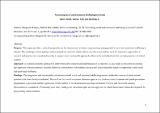| dc.contributor.author | Barry, Margaret M. | |
| dc.contributor.author | Clarke, Aleisha M. | |
| dc.contributor.author | Dowling, Katherine | |
| dc.date.accessioned | 2019-11-07T12:53:53Z | |
| dc.date.available | 2019-11-07T12:53:53Z | |
| dc.date.issued | 2017-08-07 | |
| dc.identifier.citation | Barry, Margaret M., Clarke, Aleisha M., & Dowling, Katherine. (2017). Promoting social and emotional well-being in schools. Health Education, 117(5), 434-451. doi: 10.1108/HE-11-2016-0057 | en_IE |
| dc.identifier.issn | 0965-4283 | |
| dc.identifier.uri | http://hdl.handle.net/10379/15551 | |
| dc.description.abstract | Purpose
This paper provides a critical perspective on the international evidence on promoting young people s social and emotional wellbeing in schools. The challenges of integrating evidence-based interventions within schools are discussed and the need for innovative approaches to research and practice are considered in order to support more sustainable approaches that can be embedded into the everyday practice of school systems. Design/methodology/approach
A common elements approach to intervention development and implementation is explored. A case study is presented on piloting this approach with post-primary students, based on consultations with students and teachers concerning their needs in supporting youth social and emotional wellbeing.
Findings
The integration and sustainability of evidence-based social and emotional skills programmes within the context of whole school systems is far from clearly established. Research on the use of a common elements approach to evidence-based treatment and youth prevention programmes is presented and the application of this method to the development and implementation of social and emotional learning interventions is considered. Preliminary case study findings are presented exploring this approach in school-based intervention development for post-primary school students.
Research limitations/implications
The potential of adopting a common elements approach is considered, however, more rigorous research is needed to identify the most potent strategies for social and emotional skills development.
Originality/value
Identifying a common set of evidence-based strategies for enhancing adolescents social and emotional skills could lead to innovative approaches to intervention delivery that would extend the impact and reach of evidence-based practice across diverse educational systems and school settings. | en_IE |
| dc.format | application/pdf | en_IE |
| dc.language.iso | en | en_IE |
| dc.publisher | Emerald | en_IE |
| dc.relation.ispartof | Health Education | en |
| dc.rights | Attribution-NonCommercial-NoDerivs 3.0 Ireland | |
| dc.rights.uri | https://creativecommons.org/licenses/by-nc-nd/3.0/ie/ | |
| dc.subject | Mental health | en_IE |
| dc.subject | Schools | en_IE |
| dc.subject | Learning | en_IE |
| dc.subject | Young people | en_IE |
| dc.subject | Children | en_IE |
| dc.subject | Emotional well-being | en_IE |
| dc.title | Promoting social and emotional wellbeing in schools | en_IE |
| dc.type | Article | en_IE |
| dc.date.updated | 2019-11-07T12:46:33Z | |
| dc.identifier.doi | 10.1108/HE-11-2016-0057 | |
| dc.local.publishedsource | https://doi.org/10.1108/HE-11-2016-0057 | en_IE |
| dc.description.peer-reviewed | peer-reviewed | |
| dc.internal.rssid | 12801274 | |
| dc.local.contact | Margaret Barry, Ctr For Health Promotion Studies, Room 338a, Aras Moyola, Nui Galway. 3348 Email: margaret.barry@nuigalway.ie | |
| dc.local.copyrightchecked | Yes | |
| dc.local.version | ACCEPTED | |
| nui.item.downloads | 2368 | |


